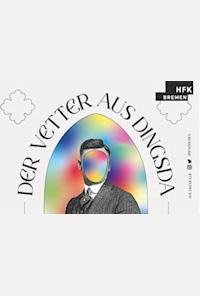Everything is required of the students on stage: singing, dancing, acting and speaking skills. The university orchestra is faced with the delightfully difficult task of making the sounds of the self-satirfying light muse float. "Der Vetter aus Dingsda", an operetta in three acts by the German composer Eduard Künneke, was chosen for this year's music theater project by the music department of the Bremen University of the Arts (HfK) .
Gregor Horres, HfK lecturer for scenic design, is directing. The musical director is Stefan Veselka, HfK professor for orchestra and ensemble conducting.
"This dreary, frustrating Corona time was probably the final trigger for dealing with the light muse," says director Gregor Horres. "The work is packed with wonderful, well-known melodies, hits - good entertainment." Künneke wrote the piece in a time that was also pandemic. In April 1920, the Spanish flu was defeated, in April 1921 “Der Vetter aus Dingsda” premiered in the Berlin Theater on Nollendorfplatz.
Loved, flirted, sung and lied to in the piece, the bourgeoisie satirically impaled with puns and situation comedy and paid homage to the dancing frenzy of the Golden Twenties with Boston waltz, foxtrot, paso doble, tango and shimmy interludes. As a postillon d'amour, the good old moon as the light source romanticizes the characters' dreams of love. No wonder everyone is trying to marry themselves or someone else.
Above all, the relatives want to decide about Julia de Weert's love life and thus about the distribution of a stately inheritance. That's why several men storm the young woman, who actually just wants to wait for her beloved Roderich. But he's been in that distant thingy for what feels like forever... somewhere in Asia... maybe in Batavia, today's Jakarta, the capital of Indonesia. But no one knows for sure - and nothing about his return either. Then a mysteriously attractive "wandering companion" appears and initiates a fast-paced comedy of mistaken identity. Is he the beautiful Roderich or just a hypocrite who smells a dowry? Immersed in the sound of a romantic opera, the first encounter between the two slides into a love fairytale.
“The work ends unspectacularly – no grand finale. Julia chooses the stranger,” explains Horres. Why does he appreciate the work so much? “It never loses touch with reality, characters and situations are described and drawn very precisely. In the spirited pace of tango or foxtrot, the figures question their luck. For one, the answer is wealth, for another, love. Of course you also deal with marriage, could it be a mousetrap?” Horres says. The libretto says about marriage as a mousetrap: "Some people come in, but no one comes out, because the door only goes inwards."


